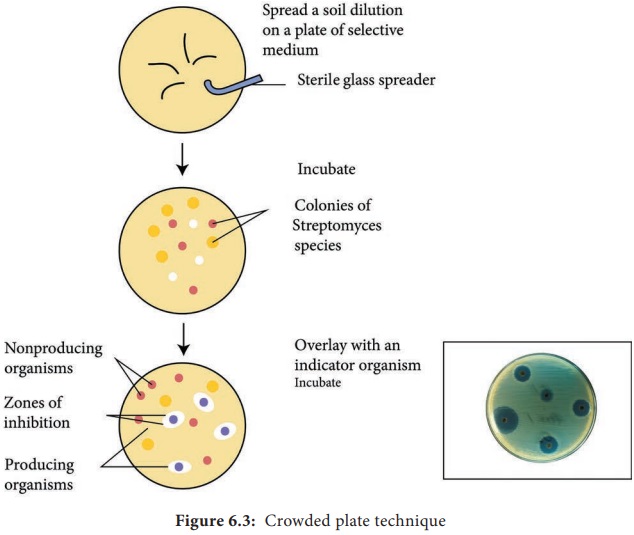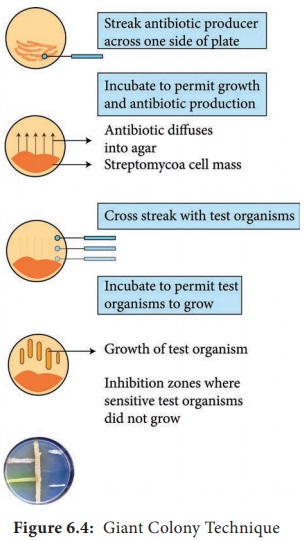Industrial Microbiology - Screening of Industrially Important Microorganism | 12th Microbiology : Chapter 6 : Industrial Microbiology
Chapter: 12th Microbiology : Chapter 6 : Industrial Microbiology
Screening of Industrially Important Microorganism
Screening of Industrially Important Microorganism
Isolation of industrially important microorganisms
Success
of fermentation depends upon the isolation of microorganism. The microorganisms
are isolated from their natural habitats like soil, lakes, river mud or even in
unusual habitats or environments such as extreme cold, high altitude, deserts,
and deep sea and petroleum fields and are tested directly for the product
formation and isolated or it can be genetically modified. Different types of
microorganisms are isolated by different methods.
Different
microbes with desired activity are isolated using various culture techniques.
The next step after isolation of microorganisms is the selection or screening.
For the successful fermentation process, selection of microorganisms is the
prime important step. Screening includes primary screening and secondary
screening.
Primary screening: The
elementary steps that are performed
to select the desired organisms and eliminate the undesirable organisms are
termed as primary screening. Methods such as crowded plate technique,
auxanography and enrichment culture technique are some of the techniques used
in primary screening. For screening of antibiotic producing organisms crowded
plate technique is described here,.
Crowded plate technique
1. Soil is serially diluted
2. The serially diluted sample is spread on the
nutrient agar plates
3. The plates are incubated and the agar plate
having 300 to 400 colonies are observed for antibiotic producing activity
4. The ability of a colony to exhibit antibiotic
activity is indicated by the presence of a zone of inhibition surrounding the
colony
5. The technique is improved by using test organism
6. The antibiotic produced by the organisms in the
soil may inhibit the growth of test organism
7. The formation of inhibitory zones around certain
colonies indicates their antibiotic sensitivity
8. The
diameter of the zones of inhibition is measured in millimeters. Crowded plate
technique is depicted in the diagram (Figure 6.3).

Enrichment isolation
The
process of enrichment provides a suitable condition to support the growth of
microorganisms. It allows the growth of the specific microbe while inhibiting
the other non-target microbe. The growth of target microorganisms is enriched
by providing sole carbon source. For screening microorganisms degrading the
compound, different inhibitors are employed which have the ability to block a
specific metabolic pathway of the non– target microbe. pH and temperature are
also adjusted favoring the growth of desired microorganisms. Soil Calcium
carbonate enrichment technique is used for isolation of secondary metabolite
producing microorganisms (actinomycetes)
Secondary screening
It is very useful in sorting out microorganisms that have real commercial value from many isolates obtained during primary screening.
HOTS: Why microorganisms are
exploited more than plant and animal cells for production of commercial
products?
1. As primary screening allows the detection and isolation
of microorganisms which posses, potentially interesting industrial
applications. It is further followed by secondary screening, to check the
capabilities and gain information about these organisms.
2. Through primary screening only few or many
microorganism that produce a industrially important product, are isolated. The
information about the product formed is very less. So, through secondary
screening, further sorting out is performed. In this method, only
microorganisms with real commercial value are selected and those that lack the
potential are discarded.
3. Secondary screening should yield the types of
information which are needed in order to evaluate the true potential of a
microorganisms industrially usage.
4. Secondary screening may be qualitative and
quantitative in its approach.
5. It is done by using paper, thin layer or other
chromatographic techniques.
6. The product’s physical, clinical, and biological
properties are determined.
7. It detects gross genetic instability in
microbial cultures.
8. It gives information about the number of
products produced in a single fermentation.
9. It determines the optimum conditions for growth
or accumulation of a product associated with particular culture.
10. It gives information about the different
components of the fermentation medium.
11. It helps in providing information regarding the
product yield potential of different isolates.
12. It reveals whether microorganisms are capable
of a chemical change or it destroys their fermentation product.
There are various methods employed for secondary
screening which includes test conducting on petridish containing solid media or
by using flasks or small fermentors containing liquid media, giant colony
technique, and filtration method liquid medium method (using Erlenmeyer flask).
Here giant colony technique is explained in detail.
Giant Colony Technique
The
Streptomyces culture is inoculated onto the central areas of petriplates
containing a nutritious agar medium or they are streaked in a narrow band
across the centre of plates. The plates are then incubated until growth and
possibly, sporulation have occurred. Strains of micro organisms to be tested
for possible sensitivity to the antibiotics (the test organisms) are then
streaked from the edges of the plates up to but not touching the Streptomycete growth. The plates are
further incubated to allow the growth of the test organism. The growth of the
test organism inhibited by antibiotic in the vicinity of the Streptomycete is
then measured in millimeters. These Streptomycetes that have produced
antibiotics with observable microbial inhibition spectrum are retained for
further testing (Figure 6.4).

The
microbes used in the industrial microbiology should have following characters.
1. The
strain should be a high–yielding strain.
2. The strain
should have stable biochemical and genetical characteristics.
3. It
should not produce undesirable substances.
4. It
should be easily cultivated on large scale.
The strain should be in pure culture, free from other microorganisms including Bacteriophages. These characters are screened for the production of desirable products from microorganisms.
Related Topics